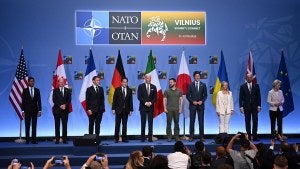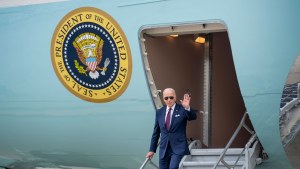Americans Say US Security Relationships around the World Strengthen National Security

The US public sees benefits from ties with Ukraine, Taiwan, and more.
Ongoing conflicts around the world continue to dominate headlines in the United States. The war in Ukraine continues with no end in sight, Israel’s war with Hamas is now expanding, and the possibility of conflict in Asia involving Taiwan is an ongoing concern. The potential for these conflicts to draw in the United States has led to an ongoing debate about how its security relationships around the world affect US security.
This is not a new debate. There have long been fears about entanglement arising from US relations around the world. But at present, those fears do not seem to be reflected among the American public. The 2023 Chicago Council Survey—conducted September 7-18, 2023—finds that Americans largely see many US security relationships around the world as strengthening US national security, not weakening it.
Take, for example, Ukraine. It has been involved in a grueling war with Russia since Moscow invaded in February 2022. The United States, along with other countries, continue to send economic and military assistance to Kyiv and the public has been broadly supportive. Even after more than a year, the Council survey finds that a majority of Americans favor continuing to send economic assistance and additional military arms and supplies. That continued support may be, in part, due to the fact that six in 10 Americans (60%) say the US security relationship with Ukraine does more to strengthen US national security versus 36 percent that say it does more to weaken US national security.
And it is not only about Ukraine or Europe (77% say that US-German relations are also a plus) that Americans express these views. Majorities of Americans say the same about Taiwan, South Korea, and Japan. Of course, none of these countries are currently involved in a shooting conflict—although South Korea technically remains at war with North Korea.
Perhaps the most interesting attitudes are on Saudi Arabia. Prior to the Hamas attacks on Israel that led to a broader conflict, the Biden administration was reportedly seeking to establish a a defensive treaty with Saudi Arabia that would also see Saudi Arabia normalize ties with Israel. The proposal was highly controversial. Among the American public, Saudi Arabia is the only country included in the survey for which more Americans say US national security is weakened by the security relationship. While 45 percent say the relationship strengthen US national security, 50 percent say it weakens US national security. The reasons for this are not clear in the data. While Saudi Arabia is involved in an active conflict with the Houthis in Yemen, that conflict receives virtually no coverage in US media. Instead, these views are more likely tied into perception of Saudi Arabia’s human rights record.
Finally, it is critical to note that this survey was conducted prior to the October 7 Hamas attack on Israel. In September, a majority of Americans (64%) said the US security relationship with Israel does more to strengthen US national security. However, the Hamas attack—and Israel’s subsequent invasion of Gaza—may have shifted these numbers dramatically in either direction.


This analysis is based on data from the 2023 Chicago Council Survey of the American public on foreign policy, a project of the Lester Crown Center on US Foreign Policy. The 2023 Chicago Council Survey was conducted September 7-18, 2023 by Ipsos using its large-scale nationwide online research panel, KnowledgePanel, in both English and Spanish among a weighted national sample of 3,242 adults aged 18 or older living in all 50 US states and the District of Columbia. The margin of sampling error for the full sample is ±2.0 percentage points. The margin of error is higher for partisan subgroups or for partial-sample items.
Partisan identification is based on how respondents answered a standard partisan self-identification question: “Generally speaking, do you think of yourself as a Republican, a Democrat, an Independent, or what?”
The 2023 Chicago Council Survey is made possible by the generous support of the Crown family, the Korea Foundation, and the United States-Japan Foundation.
Related Content
 US Foreign Policy
US Foreign Policy
The public supports US participation in the Paris climate agreement, the Iran nuclear deal, and more.
 Public Opinion
Public Opinion
As the war in Ukraine continues, majorities say the United States should maintain or increase its commitment to NATO.
 Public Opinion
Public Opinion
But partisan divisions over using US troops to defend allies in Europe and Asia are growing.
 US Foreign Policy
US Foreign Policy
For the first time, a majority of Republicans think the United States should stay out of world affairs.